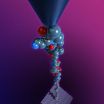(Press-News.org) In conversation, we often imitate each other's speech style and may even change our accent to fit that of the person we're talking to. A recent study in Psychological Science, a journal of the Association for Psychological Science, suggests that imitating someone who speaks with a regional or foreign accent may actually help you understand them better.
"If people are talking to each other, they tend to sort of move their speech toward each other," says Patti Adank, of the University of Manchester, who cowrote the study with Peter Hagoort and Harold Bekkering from Radboud University Nijmegen in the Netherlands. People don't only do this with speech, she says. "People have a tendency to imitate each other in body posture, for instance in the way they cross their arms." She and her colleagues devised an experiment to test the effect of imitating and accent on subsequent comprehension of sentences spoken in that accent.
In the experiment, Dutch volunteers were first tested on how well they understood sentences spoken in an unfamiliar accent of Dutch. To make sure that all listeners were unfamiliar, a new accent was invented for the study, in which all the vowels were swapped (for instance 'ball' would become 'bale'). Next, each participant listened to 100 sentences in the unfamiliar accent. But first, they were given different instructions on how to respond to the sentences. Some were told to repeat the sentence, imitating the accent. Others were told either only to listen, to repeat the sentences in their own accent, or to transcribe the accented sentences as they had heard them, complete with strange vowels. Finally, the participants were tested again on how well they could understand sentences spoken in the unfamiliar accent.
People who had imitated the accent did much better at understanding the sentences than the other people. "When listening to someone who has a really strong accent, if you talked to them in their accent, you would understand better," Adank says. Of course, she says, "it's obvious that you can't really do that." If you put on, say, a fake Southern accent when talking to someone from Georgia, they might not think your intention is friendly. But when your brain subtly and unconsciously shifts your voice to sound more like theirs, it appears to be deploying a useful strategy.
###
The APS journal Psychological Science is the highest ranked empirical journal in psychology. For a copy of the article "Imitation Improves Language Comprehension" and access to other Psychological Science research findings, please contact Keri Chiodo at 202-293-9300 or kchiodo@psychologicalscience.org.
Imitating someone's accent makes it easier to understand them
2010-12-07
ELSE PRESS RELEASES FROM THIS DATE:
Missouri grapes hold key to improving world grape production
2010-12-07
In a few years, a sip of Cabernet Sauvignon, Merlot or Pinot Noir may include a taste of the "Show-Me" State. The state grape of Missouri – the Norton variety grown at many vineyards around the state – is resistant to powdery mildew, a fungal pathogen that affects winemaking grapes around the world. Now, researchers at the University of Missouri are working to identify valuable genes from the Norton grape for eventual transfer into other grapes to make them less susceptible to mildew, decrease fungicide use and increase world-wide grape production.
Walter Gassmann, ...
Early physical therapy for low back pain associated with less subsequent health care utilization
2010-12-07
The American Physical Therapy Association (APTA) is pointing to a new study on low back pain in Medicare patients in its efforts to encourage the newly established Center for Medicare and Medicaid Innovation to promptly launch a demonstration project on direct access to physical therapist services that was recommended in the recent health reform law. The study, published in the journal Spine, showed Medicare patients who received physical therapy in the acute phase following an episode of low back pain were less likely to receive epidural steroid injections, lumbar surgery, ...
Illinois study: Ginseng just got better -- not as bitter
2010-12-07
URBANA – University of Illinois scientists have learned to mask the bitterness of ginseng, a common ingredient of energy drinks.
"Consumers like to see ginseng on a product's ingredient list because studies show that it improves memory, enhances libido and sexual performance, boosts immunity, and alleviates diabetes. But the very compounds that make ginseng good for you also make it taste bitter," said Soo-Yeun Lee, a U of I associate professor of food science and human nutrition.
In an earlier study, Lee and U of I professor of food chemistry Shelly J. Schmidt found ...
Optics Express focus issue on chalcogenide photonics: Fabrication, devices and applications
2010-12-07
WASHINGTON, Dec. 6—Recent progress in chalcogenide glass photonics has been driven by scientific and technological challenges in a variety of areas. These range from increased demand for bandwidth in optical communications, to the emergence of bio-health hazards associated with hazardous microorganisms that absorb at mid-infrared wavelengths, to defense applications that require bright mid-infrared sources. Additionally, chalcogenide glass provides a platform for fundamental investigations of light-matter interactions in nanophotonic structures, such as photonic crystals ...
Fleshing out the life histories of dead whales
2010-12-07
Dead whales that sink down to the seafloor provide a feast for deep-sea animals that can last for years. Previous research suggested that such "whale falls" were homes for unique animals that lived nowhere else. However, after sinking five whale carcasses in Monterey Canyon, researchers from the Monterey Bay Aquarium Research Institute (MBARI) found that most of the animals at these sites were not unique to whale falls, but were common in other deep-sea environments as well. Nonetheless, the whale-fall communities did include a few very abundant animals that were "bone ...
A flu vaccine that lasts
2010-12-07
WHAT: The costly, time-consuming process of making, distributing and administering millions of seasonal flu vaccines would become obsolete if researchers could design a vaccine that confers decades-long protection from any flu virus strain. Making such a universal influenza vaccine is feasible but licensing it may require innovation on several fronts, including finding new ways to evaluate the efficacy of vaccine candidates in clinical trials, conclude scientists from the National Institute of Allergy and Infectious Diseases (NIAID), part of the National Institutes of Health. ...
Rice physicists help unravel mystery of repetitive DNA segments
2010-12-07
HOUSTON -- (Dec. 6, 2010) -- With new tools that can grab individual strands of DNA and stretch them like rubber bands, Rice University scientists are working to unravel a mystery of modern genomics. Their latest findings, which appear in Physical Review Letters, offer new clues about the physical makeup of odd segments of DNA that have just one DNA base, adenine, repeated dozens of times in a row.
These mysterious "poly(dA) repeats" are sprinkled throughout the human genome. Scientists have also found them in the genomes of animals, plants and other species over the ...
Why married men tend to behave better
2010-12-07
EAST LANSING, Mich. — Researchers have long argued that marriage generally reduces illegal and aggressive behaviors in men. It remained unclear, however, if that association was a function of matrimony itself or whether less "antisocial" men were simply more likely to get married.
The answer, according to a new study led by a Michigan State University behavior geneticist, appears to be both.
In the December issue of the Archives of General Psychiatry, online today, S. Alexandra Burt and colleagues found that less antisocial men were more likely to get married. Once ...
Exposure to more diverse objects speeds word learning in tots
2010-12-07
Two toddlers are learning the word "cup." One sees three nearly identical cups; the other sees a tea cup, a sippy cup and a Styrofoam cup. Chances are, the second child will have a better sense of what a cup is and -- according to a new University of Iowa study -- may even have an advantage as he learns new words.
Published this month in Psychological Science, a journal of the Association for Psychological Science, the research showed that 18-month-olds who played with a broader array of objects named by shape – for example, groups of bowls or buckets that were less similar ...
Study reveals 'secret ingredient' in religion that makes people happier
2010-12-07
WASHINGTON, DC, December 1, 2010 — While the positive correlation between religiosity and life satisfaction has long been known, a new study in the December issue of the American Sociological Review reveals religion's "secret ingredient" that makes people happier.
"Our study offers compelling evidence that it is the social aspects of religion rather than theology or spirituality that leads to life satisfaction," said Chaeyoon Lim, an assistant professor of sociology at the University of Wisconsin-Madison, who led the study. "In particular, we find that friendships built ...


